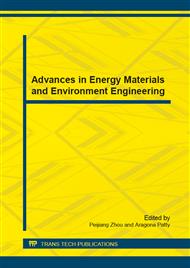p.407
p.413
p.417
p.426
p.431
p.437
p.442
p.447
p.451
An Analysis of Simulation System of CO2 Emission and Emission Reduction Paths in Chongqing’s Electric Power Industry
Abstract:
This paper predicts and analyzes the output, energy consumption and CO2 emission in Chongqing’s electric power industry in 16 years to come using a dynamics simulation system of carbon emission. A comparison with historical data indicates a desirable goodness of fit of the simulated results, which show that the power generation in Chongqing will reach the peak of about 180 billion KWH in 2020 and 378 billion KWH in 2030, followed by a steady rise in the following 15 years; the per capita power consumption will reach 5350 KWH in 2020 and 12,000 KWH in 2030; the CO2 emission will reach about 102,200,000 tons in 2020 and about 232,600,000 tons in 2030; the CO2 emission per unit electricity generation will reach 570gco2/kwh in 2020 and about 620gco2/kwh in 2030. Based on the data, this paper analyzes the influence of different technical paths and policy options on emission in various developmental scenarios, and proposes specific paths for emission reduction.
Info:
Periodical:
Pages:
431-436
DOI:
Citation:
Online since:
December 2014
Authors:
Price:
Сopyright:
© 2015 Trans Tech Publications Ltd. All Rights Reserved
Share:
Citation:


